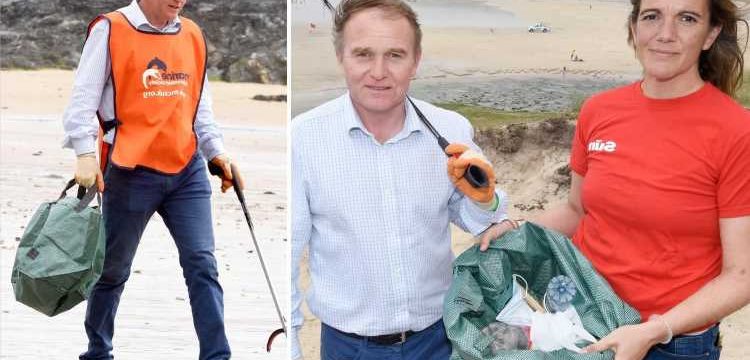LOCAL Tamsin Floyd has been doing regular beach cleans in her sleepy village of Porthtowan in Cornwall since 2015.
Of the hundreds of bags of litter she and her daughters Ruby 13, Eloise 11 and Florence, 6 have collected, only in the last 16 months have masks become an issue.
"I’ve definitely noticed mask litter since the pandemic," says Tamsin.
"On the beaches and commonly in car parks and shopping areas. They tend to be the disposable types, along with latex gloves as well."
Environment secretary George Eustice who joined Tamsin and other local volunteers for the beach clean during the G7 summit says The Sun’s Mask Force campaign – encouraging disposable mask recycling at 488 Morrison’s stores across the country – is invaluable.
"I do at least a couple of beach cleans every year and often go out with the Marine Conservation Society. A lot of the things that they're seeing now are pandemic related litter; masks and the like that are harming our marine environments.
"As a nation we are rightly proud of our beautiful beaches and green spaces. That is why it is so distressing to see individuals chucking plastic bottles and food wrappers across some of our favourite beauty spots."
Litter has soared over the pandemic with masks and plastic gloves being washed up
Mr Eustice, who uses washable reusable masks at DEFRA, says a summer of staycationing and changes in behaviour since the pandemic are causing problems for our seas.
"More people are using our coasts and beaches which is great but we know from volunteer beach cleans more masks are ending up in our seas which is why I fully support The Sun’s Mask Force campaign to recycle masks into PPE equipment.
"Fewer people are using reusable cups now than they were pre pandemic and we know at the height of lockdown litter picks couldn’t happen and people were fearful of picking litter that might be contaminated.
"We must all play our part to tackle the scourge of litter, by putting rubbish in the bin or taking it home, signing up for beach cleans and making sure facemasks and other single-use items are properly disposed of.
"And we are pushing further to cut litter with new powers set to make manufacturers take more responsibility for the packaging they produce and putting in place a deposit return scheme so billions more drinks bottles and cans are recycled."
Plastic has been a long-running issue for local beach cleaner Tamsin
While plastic in the oceans from disposable masks is a new problem, general plastic isn’t, especially for Tamsin.
When the Tokio Express container ship hit a storm near Land’s End in 1997, nearly 4.8 million Lego pieces were washed into the ocean and Tamsin and her daughters are still finding them alongside nurdles – plastic in it’s raw form which are colloquially known as mermaid’s tears. "I collect them with a dust pan and brush at Porthtowan," says Tamsin.
"They are often found on the high tide marks. They are plastic in its raw form before it is processed into masks or whatever it’s going to be made into.
"It is likely to be in the sea following a cargo spills, which are surprisingly common. Our local factory in Redruth – Curver – is a multi-national company making many plastic household items.
"The team at Curver are able to put them to use in production of certain items so when I collect enough, I drop them off there."
With almost 70 percent of litter cleans across the country finding masks or PPE gear, the Marine Conservation Society are asking YOU to sign up to a beach clean in your local area.
A spokesperson for MCS says "The unique thing about Marine Conservation Society’s beach cleans is that we conduct litter surveys on each clean, logging what litter is collected which feeds into a now 26 year dataset."
While organised beach cleans are happening across the country every weekend, Tamsin says even picking up one piece of litter can make a difference.
"It is easy to have a mindset to look at what should not be there and feel aggrieved, it is quite easy though to remove it and see it as part of our lives to do what we can and think of the benefits to the environment."
Source: Read Full Article




